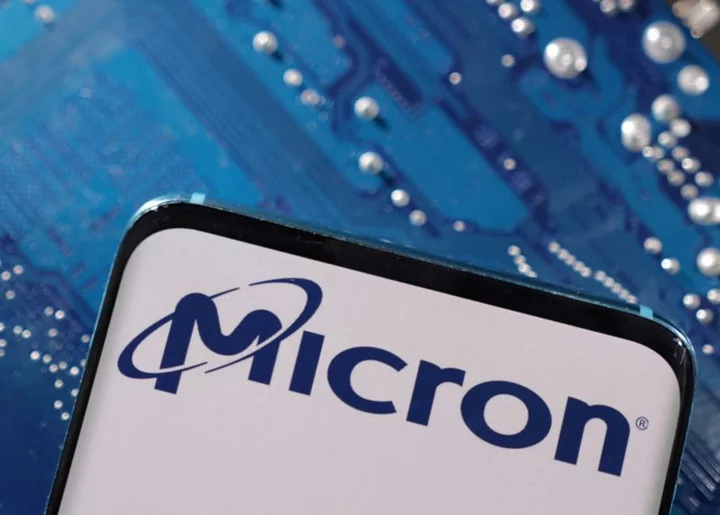By Eduardo Baptista
BEIJING In the years before China declared U.S. firm Micron Technology's products a national security risk, authorities were already scaling back purchases of its chips, opting instead for domestic or South Korean options, documents showed.
A Reuters review of over a hundred public government tenders found that while previously Chinese government authorities regularly put out purchase requests for Micron's chips for use in projects such as tax systems to surveillance networks, such requests dried up dramatically from 2020.
Instead, the bulk of memory chip purchases from such entities have gone to domestic firms including Huawei Technologies, server maker Inspur as well as surveillance giants Uniview and Hikvision.
While China's sudden move this week to block key industries from using Micron products appeared to be the result of heightened Sino-U.S. tensions, the tender documents suggest Beijing had laid the groundwork for years, in effect limiting the disruptions caused by such a ban.
At the same time, analysts say the biggest U.S. memory chip maker had become an easier target if Beijing wanted to retaliate against Washington's curbs on tech exports, given China's own advances in memory chip production.
"Most of its chips are replaceable with Chinese-made alternatives, and for those that are not, there are other foreign firms whose chips China can procure," said Alfredo Montufar-Helu, Beijing-based head of think tank The Conference Board's China Center.
"So banning Micron’s products does not hurt China."
China's cyberspace regulator, which conducted the review of Micron's products, did not specify what security risks they found.
In response to Reuters' request for comment, a Micron spokesperson said the company was "assessing next steps" in response to the ban but did not comment on questions about tenders.
China's State Council did not respond to a request for comment.
DOMESTIC DRIVE
It was not clear from the tenders why requests from government-affiliated entities for Micron products dried up so dramatically from 2020, including what effect the pandemic may have had over that period.
There were only four tenders that mentioned Micron products over the past three years. They include a tender by a weather bureau from Changzhou city, in the eastern province of Jiangsu, for two dozen storage devices, and a hospital in Zouping city, in the northeastern province of Shandong, for an image sensor.
By contrast, prior to 2020, Micron's products were sought by a range of local government bodies for projects that include sensitive work such as upgrades of surveillance camera and facial recognition networks in large cities.
Micron chips, for example, were one of the many products purchased in two big tenders offered in 2019 -- one worth 187 million yuan ($27.05 million) and the other 29 million yuan -- from police authorities in the southern factory hub of Dongguan.
An August 2015 tender also showed that China's National Tax Administration spent over 5.6 million yuan on purchasing almost 8,000 Micron chips for servers in its invoice system.
China has for over a decade had a long-running campaign to reduce reliance on foreign technologies, asking state affiliated firms such as banks to switch to local software and promoting domestic chip manufacturing.
Beijing ratcheted up the campaign in 2020, when its leaders proposed a so-called "dual circulation" growth model to reduce reliance on overseas markets and technology.
Several tenders from the past year had "domestic made" product requirement requests.
For example, a January tender for a "smart public security" project in the southern city of Taishan explicitly requested flash memory chips be domestically produced, assigning it almost 200,000 yuan.
The project is made up of several hundred different pieces of hardware and software, with Hikvision supplying 41 of these, Huawei products accounting for 16, and an unspecified "domestic made" request tagged on 288 other products.
To be sure, government procurement databases often redact or eschew sensitive details, and more information on Micron orders is likely available on paid-for private tender document databases.
Chips made by South Korea's SK Hynix and Samsung Electronics also continued to be included in large government contracts, but often to supplement domestic products.
Meanwhile, U.S. firms are still big players with Intel processors, Nvidia GPUs, and Dell servers purchased by hundreds of government bodies since 2020.
However, for Micron, the dramatic drop in government tenders for its chips adds to the U.S. firm's troubles in China.
In 2018, Micron became embroiled in a patent dispute with Chinese state-backed chip maker Fujian Jinhua, accusing it of conspiring to steal trade secrets.
The dispute led to a temporary sales ban of Micron's main products in China that year, and was followed by a shutdown of its DRAM operations in Shanghai last year amid escalating trade tension with Washington.
China was once Micron's biggest market, generating half of its $20 billion revenue in fiscal 2017 - that share shrank to just 16% last year.
"Micron has been in the ‘eye of the hurricane’ for quite some time already, with its operations in China facing increasing challenges over the past years," said analyst Montufar-Helu.
On Monday, Micron forecast a percentage hit to revenue from China's action in the single digits.
($1 = 6.9121 Chinese yuan)
(Reporting by Eduardo Baptista in Beijing; Editing by Brenda Goh, Miyoung Kim and Sam Holmes)









